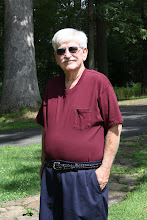A man in Topeka, Kansas decided to write a book about churches around the country. He started by flying to San Francisco and started working east from there.
Going to a very large church, he began taking photographs and making notes.
He spotted a golden telephone on the vestibule wall and was intrigued with a sign, which read "Calls: $10,000 a minute.."
Seeking out the pastor he asked about the phone and the sign. The pastor answered that this golden phone is, in fact, a direct line to heaven and if he pays the price he can talk directly to GOD.
The man thanked the pastor and continued on his way. As he continued to visit churches in Seattle, Dallas, St. Louis, Chicago, Milwaukee, and many cities and towns all around the United States, he found more phones, with the same sign, and the same answer from each pastor.
Finally, he arrived in Tennessee, upon entering a church in the beautiful Mountainous region of Tennessee, behold - he saw the usual golden telephone. But THIS time, the sign read, "Calls: 35 cents"
Fascinated, he asked to talk to the pastor, "Reverend, I have been in cities all across the country and in each church I have found this golden telephone and have been told it is a direct line to Heaven and that I could talk to GOD, but in the other churches the cost was $10,000 a minute. Your sign reads only 35 cents a call. Why?"
The pastor, smiling broadly, replied, "Son, you're in Tennessee now ... You're in God's Country. It's a local call."
American by Birth - Tennessean by the Grace of God.
And why Tennesseans do go barefoot: When you're in Tennessee you're on Holy ground!
Monday, October 12, 2009
Friday, October 9, 2009
U.S. Supreme Court upholds William Blount High School ban on Confederate flag

Blount County students won't be wearing a Confederate flag at school anytime in the future.
The U.S. Supreme Court on Monday refused to hear a petition from a group of now-former students at William Blount High School who challenged the dress code four years ago. The students were threatened with suspension if they wore Confederate flag T-shirts.
"They should have listened to it, at least heard (our) side of the story," one of the students, Craig White, told WVLT-TV.
"We were just being called out in what we were wearing, when not one of us were involved in what was going on," said his sister, Nicole White. "So it was just unfair to us."
School officials felt the policy was necessary after several race-related incidents, including:
— A racial fight at a basketball game on Feb. 22, 2005;
— An alleged hit list found on March 23, 2005;
— A school lockdown on April 6, 2005, after a student threatened to shoot several students.
The Confederate flag was never specifically banned in Blount County Schools, said Dr. Jane Morton, the system's communications director and compliance coordinator. Principals can prohibit from their schools clothes and other items that feature divisive symbols such as the Confederate flag and the swastika, she said.
Blount County Director of Schools Rob Britt said he is happy the issue is resolved. "We won at the circuit and district levels, and for the Supreme Court not hearing it, really validates and supports our policy and position."
Blount County administrators have always felt they've interpreted and implemented the school board's policy fairly and consistently in all situations, Morton said. "It's been a learning experience for all of us involved in the case; and it really set a precedent for school administrators on how to implement policy."
Britt said the end of the lawsuit reaffirms the dress code policy, and he hopes it will prevent others from trying to wear the Confederate flag in schools.
"We've always tried to keep the best interests of our students at heart," Morton said.
Arguments continue over the board policy, but Britt said tensions have calmed since 2005.
Similar cases, however, are pending elsewhere. The Confederate flag has been banned as an inflammatory symbol of racism, while flag supporters believe they have a free-speech right to express pride in their Southern heritage.
In August, a federal judge in Knoxville upheld a similar ban on Confederate-themed clothing in the Anderson County school system. The case has been appealed to the 6th U.S. Circuit Court of Appeals, in part, based on testimony that racial tensions were low at the plaintiff's school.
Meanwhile, a federal judge in South Carolina ruled last month in favor of a Confederate flag clothing ban in the Latta school system. Flag supporters say they will appeal to the 4th U.S. Circuit Court of Appeals.
The Daily Times - 9 oct 2009
Thursday, October 1, 2009
Subscribe to:
Comments (Atom)







